Excel 2007
Creating Simple Formulas
Introduction
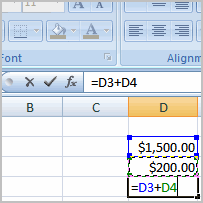 Excel can be used to calculate and analyze numerical information; however, you will need to know how to write formulas to maximize Excel's capabilities. A formula is an equation that performs a calculation using values in the worksheet. In this lesson, you will learn how to create simple formulas using mathematical operators such as the addition, subtraction, multiplication, and division signs.
Excel can be used to calculate and analyze numerical information; however, you will need to know how to write formulas to maximize Excel's capabilities. A formula is an equation that performs a calculation using values in the worksheet. In this lesson, you will learn how to create simple formulas using mathematical operators such as the addition, subtraction, multiplication, and division signs.
Simple Formulas
Watch the video! (9:08 min)
Download the example to work along with the video.
To create a simple formula that adds two numbers:
- Click the cell where the formula will be defined (C5, for example).
- Type the equals sign (=) to let Excel know a formula is being defined.
- Type the first number to be added (e.g., 1500).
- Type the addition sign (+) to let Excel know that an add operation is to be performed.
- Type the second number to be added (e.g., 200).
- Press Enter, or click the Enter button on the Formula bar to complete the formula.
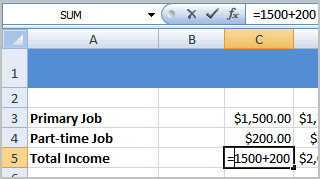
If the result of a formula is too large to be displayed in a cell, it may appear as pound signs (#######) instead of a value. This means that the column is not wide enough to display the cell content. Simply increase the column width to show the cell content.
Excel will not always tell you if your formula contains an error, so it's up to you to check all of your formulas. To learn how to do this, you can read the Double-Check Your Formulas lesson from our Excel Formulas tutorial.
To create a simple formula that adds the contents of two cells:
- Click the cell where the answer will appear (C5, for example).
- Type the equals sign (=) to let Excel know a formula is being defined.
- Type the cell number that contains the first number to be added (C3, for example).
- Type the addition sign (+) to let Excel know that an add operation is to be performed.
- Type the cell address that contains the second number to be added (C4, for example).
- Press Enter, or click the Enter button on the Formula bar to complete the formula.
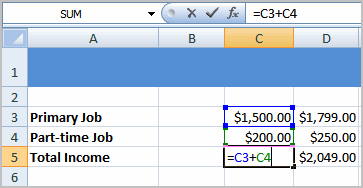
To create a simple formula using the point-and-click method:
- Click the cell where the answer will appear (C30, for example).
- Type the equals sign (=) to let Excel know a formula is being defined.
- Click on the first cell to be included in the formula (C5, for example).
- Type the subtraction sign (-) to let Excel know that a subtraction operation is to be performed.
- Click on the next cell in the formula (C29, for example).
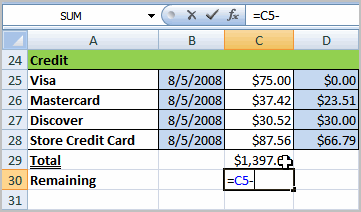
- Press Enter, or click the Enter button on the Formula bar to complete the formula.
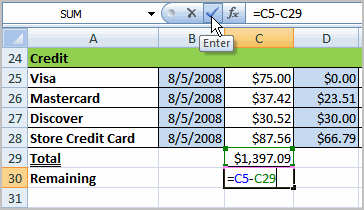
To create a simple formula that multiplies the contents of two cells:
- Select the cell where the answer will appear (E32, for example).
- Type the equals sign (=) to let Excel know a formula is being defined.
- Click on the first cell to be included in the formula (C9, for example), or type a number.
- Type the multiplication symbol (*) by pressing the Shift key and then the number 8 key. The operator displays in the cell and Formula bar.
- Click on the next cell in the formula or type a number (12, for example).
- Press Enter, or click the Enter button on the Formula bar to complete the formula.
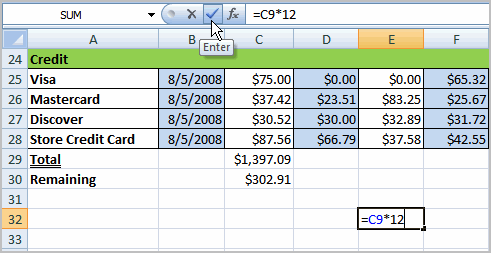
To create a simple formula that divides one cell by another:
- Click the cell where the answer will appear.
- Type the equals sign (=) to let Excel know a formula is being defined.
- Click on the first cell to be included in the formula.
- Type a division symbol. The operator displays in the cell and Formula bar.
- Click on the next cell in the formula.
- Press Enter, or click the Enter button on the Formula bar to complete the formula.
Using cell references
As you can see, there are many ways to create a simple formula in Excel. Most likely, you will choose one of the methods that enters the cell address into the formula rather than an actual number. The cell address is basically the name of the cell and can be found in the Name Box.
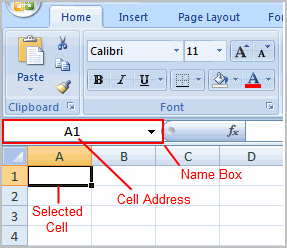
The following example uses actual numbers in the formula in C5.

When a cell address is used as part of a formula, this is called a cell reference. It is called a cell reference because instead of entering specific numbers into a formula, the cell address refers to a specific cell. The following example uses cell references in the formula in C30.

Challenge!
Use the Budget workbook or any Excel workbook you choose to complete this challenge.
- Write a simple addition formula.
- Write a simple subtraction formula using the point-and-click method.
- Write a simple multiplication formula using cell references.
- Write a simple division formula.


